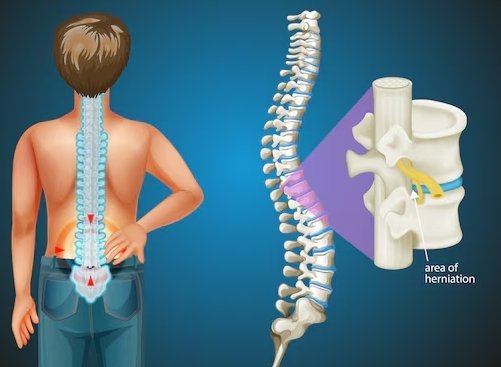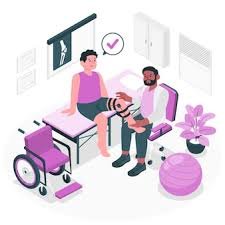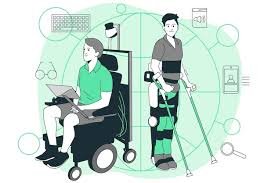Kankarbagh,Patna-800020 Landmark: Near Sri Sai Lions Netralaya
Spinal Cord Injury
Welcome to SPARC Hospital, a specialized center dedicated to treating spinal cord injuries. Our skilled team of medical professionals offers advanced, compassionate care tailored to each patient’s unique needs. Using state-of-the-art equipment and techniques, we aim to stabilize, rehabilitate, and enhance the quality of life for individuals facing spinal cord injuries. At SPARC Hospital, we understand the physical, emotional, and psychological challenges associated with these injuries and provide comprehensive support throughout the healing journey. Join us in our mission to empower patients and their families, ensuring the best possible outcomes in recovery and rehabilitation.
What is Spinal Cord Injury?
Spinal cord injury (SCI) is damage to the spinal cord that disrupts communication between the brain and the body. This damage can result in partial or complete loss of motor control, sensation, and autonomic functions below the injury site. Causes include trauma from accidents, falls, or violence, and non-traumatic causes like infections or tumors. The severity depends on the injury’s location and extent. Symptoms range from mild, temporary dysfunction to permanent paralysis and loss of sensation. Treatment focuses on stabilizing the injury, preventing complications, and rehabilitation to maximize recovery and quality of life.


Causes and Symptoms of Spinal Cord Injuries
Causes: Spinal cord injuries occur due to trauma, such as car accidents, falls, or sports injuries. These injuries can result in loss of sensory and motor function below the injury site.
Symptoms: Symptoms may include pain, numbness, weakness, difficulty breathing, or paralysis. Immediate medical attention is crucial to minimize long-term effects.
What services does our hospital provide for Spinal Cord Injury?
At SPARC Hospital, we offer a comprehensive range of services for spinal cord injury treatment, including:

Comprehensive Diagnosis
Our hospital provides thorough diagnostic assessments, including imaging tests like MRI and CT scans, to accurately diagnose the extent and severity of spinal cord injuries.

Surgical Intervention
Our team of experienced surgeons performs a range of surgical procedures tailored to treat spinal cord injuries, including decompression surgeries, spinal fusion, and implantation of spinal cord stimulators or pumps

Rehabilitation Services
We offer comprehensive rehabilitation programs designed to maximize recovery and improve the quality of life for SCI patients. This includes physical therapy, occupational therapy, and speech therapy as needed.

Pain Management
Our hospital provides specialized pain management services to address the chronic pain often associated with spinal cord injuries, utilizing a multidisciplinary approach that may include medications, nerve blocks, and alternative therapies.

Assistive Devices and Technology
We offer access to a variety of assistive devices and cutting-edge technologies to help SCI patients regain independence and mobility, including wheelchairs, orthotics, and adaptive equipment.

Psychological Support
Our hospital recognizes the emotional and psychological challenges faced by SCI patients and offers counseling and support services to help individuals and their families cope with the impact of spinal cord injuries.
The Procedure of Spinal Cord Treatment
Spinal cord injury treatment involves a multidisciplinary approach aimed at stabilizing the injury, minimizing further damage, and promoting recovery. Initial treatment often starts in an emergency setting, where a rapid assessment ensures the patient’s airway, breathing, and circulation are stabilized.
Immobilization and Surgery
Immediate immobilization of the spine is essential to prevent further damage. Surgical intervention may be required to stabilize the spine, remove debris, or repair fractured vertebrae.
Medications
Corticosteroids like methylprednisolone are sometimes administered to reduce inflammation and secondary damage after an injury.
Neuroprotection and Rehabilitation
Advanced treatments may include neuroprotective drugs to shield the nervous system from injury-induced damage and promote regeneration. Rehabilitation focuses on physical, occupational, and psychological therapy to enhance motor skills, mobility, and overall function.
Physical Therapy
Physical therapy plays a crucial role in spinal cord injury management. Exercises and activities help maintain muscle strength, prevent contractures, and promote flexibility. Tailored physical therapy programs can also improve cardiovascular health and assist in returning to a more active lifestyle.
Adaptive Devices and Assistive Technologies
Depending on the severity of the injury, assistive devices like wheelchairs, braces, or adaptive tools can support daily living tasks and increase independence.
Psychological and Emotional Support
Emotional and psychological counseling is vital in managing the emotional impact of spinal cord injuries. Mental health professionals provide support to address issues such as anxiety, depression, and coping strategies.
Why choose us for Spinal Cord Injury Treatment?
Choosing SPARC Hospital for Spinal Cord Injury (SCI) Treatment offers several compelling reasons:
Focus on Rehabilitation and Functional Restoration
Rehabilitation is a cornerstone of our approach to SCI treatment at SPARC Hospital. Our dedicated team of rehabilitation specialists works closely with patients to maximize functional recovery, improve mobility, and enhance overall quality of life following a spinal cord injury.
Holistic Support Services
In addition to medical and rehabilitative care, SPARC Hospital provides a range of holistic support services to address the physical, emotional, and psychosocial needs of SCI patients and their families. This may include pain management, psychological counseling, peer support groups, and assistance with community reintegration.
Research and Innovation
SPARC Hospital is committed to advancing the field of spinal cord injury treatment through ongoing research, innovation, and collaboration with leading experts in the field. By participating in clinical trials and adopting emerging technologies and therapies, we strive to offer our patients access to the latest advancements in SCI care.
Compassionate Care
SPARC Hospital is dedicated to providing compassionate, patient-centered care to individuals with spinal cord injuries. We understand the physical and emotional challenges associated with SCI, and we are committed to supporting our patients every step of the way on their journey to recovery and rehabilitation.
FAQs
Spinal cord injuries can result from various causes, including traumatic events such as automobile accidents, falls, sports injuries, and acts of violence. Non-traumatic causes may include diseases like spinal tumors, infections, or degenerative conditions like spinal stenosis.
Spinal cord injuries are categorized based on the severity and location of the damage. They can be complete or incomplete. Complete injuries result in total loss of sensation and motor function below the injury site, while incomplete injuries allow some degree of sensory or motor function to remain. The level of injury refers to the specific vertebrae affected and determines the extent of impairment.
It’s crucial to immobilize the injured person to prevent further damage to the spinal cord. Call emergency services immediately and avoid moving the person unless necessary. Provide basic first aid, such as stabilizing the head and neck, and wait for trained medical professionals to arrive.
Treatment for spinal cord injuries typically involves a combination of medical interventions, surgical procedures, and rehabilitation therapies. Depending on the severity of the injury, treatments may include medication to reduce inflammation and manage symptoms, surgery to stabilize the spine or decompress the spinal cord, and rehabilitation programs focused on improving function and independence.
